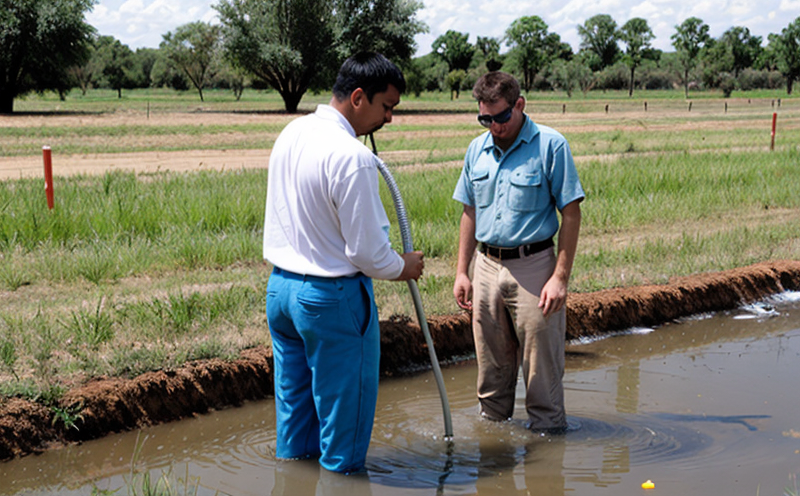ASTM D8221 Legionella Related Indicators Test in Groundwater
The ASTM D8221 standard provides a method for determining the presence of Legionella-related indicators in groundwater. This test is essential for ensuring compliance with international standards and maintaining public health, especially in environments where water systems are susceptible to contamination by Legionella pneumophila, the bacterium responsible for Legionnaires' disease.
The primary objective of this testing protocol is to identify potential sources of contamination that could lead to the proliferation of Legionella species within groundwater. This is particularly critical in sectors such as environmental protection, water treatment facilities, and public health organizations where the quality of potable water must be continuously monitored to prevent outbreaks.
Groundwater plays a vital role in the water supply chain, especially in regions without access to municipal water systems. Ensuring that this natural resource is free from harmful microorganisms is crucial for public safety. The ASTM D8221 test helps operators and environmental scientists identify any potential issues with groundwater quality before it enters the distribution network or becomes part of a larger treatment process.
The test involves collecting samples from various depths within an aquifer, which are then analyzed using microbiological methods to detect specific indicators associated with Legionella. These indicators can include compounds produced by Legionella bacteria during its growth cycle, such as phospholipids and other biomarkers that can be quantified in the laboratory.
By conducting this test, laboratories ensure that they adhere to stringent international standards set forth by organizations like ASTM International, which are recognized globally for their expertise in developing testing methods. Compliance with these standards not only protects public health but also helps companies avoid legal issues and maintains their reputation as reliable providers of safe water.
The methodology outlined in ASTM D8221 is designed to be robust yet flexible enough to accommodate different groundwater conditions across various regions. This adaptability ensures that the test remains effective even when faced with diverse environmental challenges, such as varying temperatures, pH levels, and mineral content.
In summary, the ASTM D8221 Legionella-related indicators test in groundwater is a critical tool for maintaining water quality standards and protecting public health. By leveraging this testing protocol, organizations can ensure that their operations are not only compliant with international regulations but also contribute positively to environmental sustainability efforts.
Benefits
- Promotes Public Health: Identifying Legionella-related indicators in groundwater helps prevent the spread of waterborne diseases, safeguarding public health and well-being.
- Avoids Legal Issues: Compliance with ASTM standards protects against potential legal challenges related to water quality and safety.
- Enhances Reputation: Demonstrating adherence to international best practices boosts an organization's credibility and reputation in the industry.
- Promotes Environmental Sustainability: Ensuring groundwater quality supports long-term environmental sustainability goals by reducing contamination risks.
Why Choose This Test
The ASTM D8221 Legionella-related indicators test in groundwater is a cornerstone for maintaining water quality and ensuring public health. Here are several compelling reasons why this testing method should be part of any comprehensive water management strategy:
Comprehensive Analysis: The test provides detailed insights into the microbial ecology of groundwater, identifying not just Legionella but other potential pathogens that could pose risks.
International Recognition: Adhering to ASTM standards ensures that your testing methods are recognized and respected globally, making it easier to meet international standards and requirements.
Preventive Measures: By detecting indicators of Legionella early, you can implement preventive measures before a full-blown outbreak occurs, saving both time and resources in the long run.
Data Accuracy: The rigorous testing protocol ensures accurate results every time, providing reliable data for decision-making processes related to water quality management.
Regulatory Compliance: This test helps organizations stay compliant with regulatory bodies like ASTM International, ensuring that they meet all necessary standards and requirements.
Sustainable Operations: By maintaining high-quality groundwater, you contribute to the sustainability of your operations, which is increasingly important in today's environmentally conscious world.
Competitive Advantage and Market Impact
The ASTM D8221 Legionella-related indicators test in groundwater offers significant competitive advantages that can positively impact an organization's market position:
Innovation Leadership: Being at the forefront of water quality testing ensures that your organization remains innovative, setting a benchmark for others to follow.
Customer Trust: Demonstrating a commitment to public health and environmental sustainability builds trust with customers and stakeholders, fostering long-term relationships.
Operational Efficiency: Early detection of potential issues allows for proactive management strategies, reducing downtime and operational disruptions.
Sales Opportunities: Offering this advanced testing service can open up new markets and opportunities for collaboration with other organizations focused on water quality and safety.
Market Differentiation: Providing a unique selling proposition in the form of robust and reliable groundwater testing services sets your organization apart from competitors, enhancing its market position and reputation.





